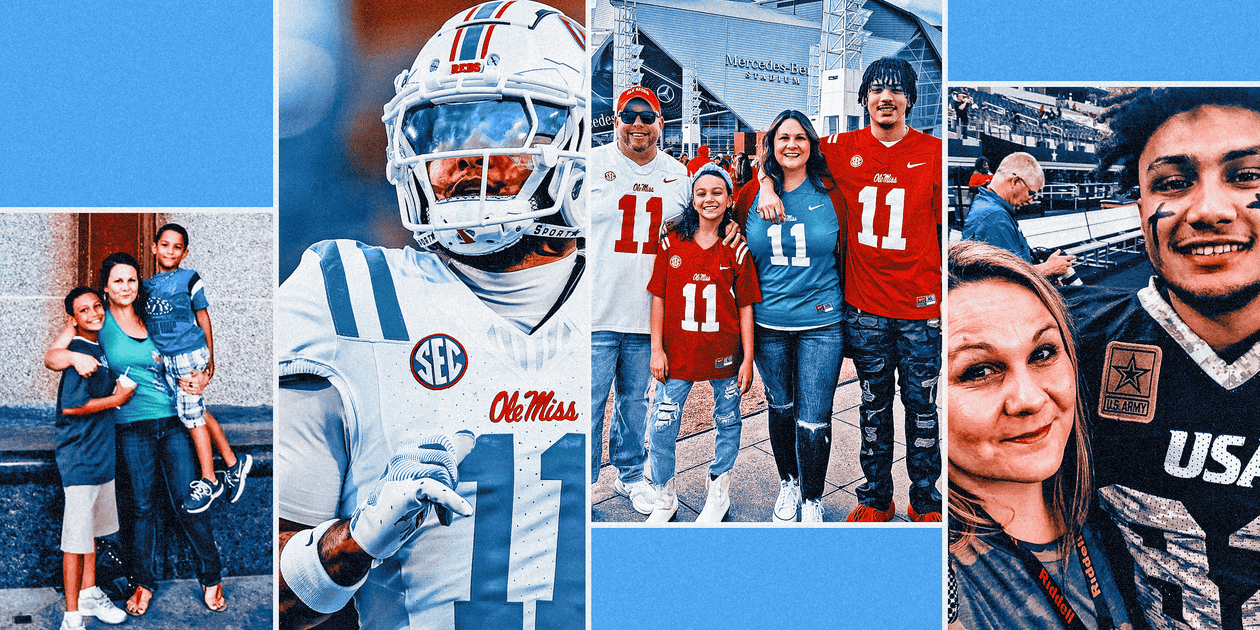LOUISVILLE, Ky. — They called him “Nowhere.”
He was 11 years old when he showed up with little to no warning on the football field behind Doss High School. It was one of the few times that Tim Richardson, who ran the local youth football league, didn’t have the skinny on one of the players.
“No one knew who he was,” said Richardson. “We didn’t know what to do with him.”
The coaches were so caught off guard they played the kid on offensive and defensive lines as a seventh grader. Once Richardson got him as an eighth grader, he realized the quiet, mysterious outsider was outrunning everyone else on the team, much too fast and athletic to linger in the trenches. Richardson moved him to receiver, quarterback, running back — any position where he could put the ball in his hands — unlocking the best player on one of the top youth teams in the country.
“I had him touch it about every other play,” Richardson said. “He might have had 35 touchdowns that season.”
But even as a star player, with area high school coaches scouting his games, he remained the unknown kid who showed up out of the mist, a trace of something unsaid always trailing close behind him.
On the back of his jersey, instead of his name, they even put “NO-WHERE.”
Today, Jordan Watkins is a senior wide receiver for the Ole Miss Rebels, No. 16 in the College Football Playoff rankings. Last Saturday, Watkins set two Ole Miss single-game receiving marks with 254 yards and five touchdowns in a win at Arkansas. This Saturday, the Rebels and Lane Kiffin’s high-powered offense will take the field in Oxford, Miss., against the No. 3 Georgia Bulldogs in search of a victory to bolster their chances of making the 12-team Playoff.
But before he became a record-setting starter on a top-rated SEC offense, Watkins was that kid from nowhere.
When Watkins was 8 years old, he sobbed as he watched his mom was driven away in the back of a cop car. He can still hear the officer telling him, “Don’t worry, your mom will be back soon.”
He didn’t see her again for almost two years.
Paula Baker was a child of addiction. She started drinking at age 12, smoked weed as a teenager, used cocaine at 18 and got hooked on OxyContin at 21. She was a mother of two by then, having Jordan at 17 and his younger brother, Elijah, a few years later.
She did her best to keep the substance abuse out of the house and away from the kids, but eventually started trafficking drugs to feed her habit. At age 25, she got kicked out of her apartment in central Ohio, so she packed up her two boys and called a friend back home in Ashland, Ky., asking if they could crash at her place. They arrived in the middle of the night, Watkins and his little brother asleep in the back seat. Paula got arrested the next day, busted for making a deal to scrounge up money for a new place to stay, violating parole in the process.
“That was the bottom for me,” Paula said.
She wound up at the Western Kentucky Correctional Facility, where she spent more than 18 months. The boys stayed with their aunt in Ashland, five hours away on the opposite side of the state. They didn’t see their mom for her entire incarceration. Watkins would tell his friends that she was on a business trip.
Paula was eventually paroled and granted a conditional release to The Healing Place, a recovery center in Louisville, where she was required to spend another 18 months. It was a couple of hours closer to Ashland, and her sister brought the boys to see her the week she arrived. They all sat together in the common room around a Christmas tree.
She had been sober for more than a year and a half by that point, but quickly realized she had no true understanding of addiction or recovery.
“I didn’t know addiction was a disease, or that I wasn’t a horrible person. But I heard these stories of recovery, and that’s what I wanted,” she said. “I didn’t want to live a chaotic life anymore.”
By May 2013, she had completed her recovery program and was working part-time at The Healing Place, saving up enough money to get a place with Austin Baker, her future husband, who had just gone through his own recovery program. She regained full custody of her boys and moved them from Ashland to Louisville.
Eleven-year-old Watkins struggled with the transition. Watkins’ father had never been a consistent figure in his life, and now he had to leave his friends in Ashland for a new city, to move in with his mom after more than three years apart, and with Austin suddenly in the picture.
“He was mad, and I understood why,” said Paula. “He didn’t know what was going to happen, if I was going to end up back in prison. It was all new for him too.”
The football field was Watkins’ haven.
“You could tell when he showed up, it was an outlet for him,” said Richardson.
For the next few years, Watkins lashed out at home and picked fights at school, following a timeworn recipe of rebellious behavior.
“It took me a very long time to forgive my mom for going away,” said Watkins. “I hate that in retrospect, because I love my mom to death, but I was clearly acting out to show how much resentment I had toward her.”
Richardson heard stories about Watkins causing trouble, but he never saw it on the field. Watkins would ask questions about route-running and schemes, but he mostly kept to himself, burying that anger.
Things started to turn during Watkins’ freshman year of high school. He was ineligible for the football team at his public school because of all the suspensions he racked up, so Paula and Austin enrolled him in a private school, barely able to afford his tuition.
“They had to sacrifice everything just so I could play football,” said Watkins. “I messed things up by being spiteful, but I saw what they were trying to do for me.”
He didn’t come to this realization immediately, or all on his own. There was a lot of therapy, as a family and individually. Watkins bucked against it at first, then was drawn to it, working with a therapist named David for a few years. The two of them would grab a bite to eat. Take walks. Visit the library to do homework.
“There are still a lot of people in today’s society that think therapy is for sissies, that as a man you have to be tough. I try to be open about the fact that therapy changed my life,” said Watkins. “David didn’t expect anything in return from me, didn’t need me to be someone I wasn’t. He was just trying to help me.”
Once Watkins accepted that his mom and Austin were trying to help, too, the scars began to heal.
By his senior year at Butler Traditional High School, he emerged as a three-star wide receiver and committed to play for Louisville in the 2020 class. He liked the idea of his family being a 10-minute drive from the stadium, but after two years with the hometown Cardinals, he entered the transfer portal. Watkins received plenty of interest, but Kiffin — who has been open about his own journey to sobriety — sold him on Ole Miss.
“Coach Kiffin told Jordan if he wanted to go to the NFL, he needed to come play for him,” said Austin.
Watkins has 118 catches for 1,739 yards and 12 touchdowns midway through his third season with the Rebels. Paula didn’t love her son moving more than six hours away, but she recognized what it could mean for his future, that he was ready for a new challenge. And she was ready, too.
Paula has been sober for more than 14 years. These days, Watkins is a self-described “mama’s boy” who talks to her every day. He’s grown close with Austin, too, the first person Watkins called when he got the new College Football 25 video game featuring his own likeness, and whom he immediately FaceTimed when he hit a hole-in-one this summer, out of breath from sprinting to the green. Watkins will regularly send pictures to the family group chat of what he cooked for dinner on his flat-top grill.
“I’ve always held onto that little bit of hope: If you wake up and keep doing it day by day, things get better,” said Paula. “And it’s true.”

Ole Miss wide receiver Jordan Watkins, pictured with his mother, Paula Baker, says therapy changed his life. (Courtesy of Paula Baker)
Ken Trogdon was giddy watching the highlights of Ole Miss’ win last week. The South Carolina alum and resident is a loyal Gamecocks supporter, but he’s become a fan of the Rebels through his connection to Watkins, whom he met earlier this year.
“Five touchdowns? I was so excited for Jordan,” said Trogdon. “He’s such a special young man.”
About 12 years ago, Trogdon, a healthcare administrator, founded HarborPath as a nonprofit organization that supplies medications to vulnerable populations nationwide. That mission soon intersected with the opioid and fentanyl crises, including efforts to distribute and inform people about naloxone — commonly known as Narcan — a drug that can reverse opioid and fentanyl overdoses. For the past few years, HarborPath has worked to get naloxone within arms reach of as many people as possible.
That’s what brought Trogdon to Ole Miss this past winter. HarborPath supplied Narcan to the William Magee Center, founded in 2019 in honor of a former Ole Miss track athlete who died of an accidental overdose. Anyone can stop by and pick up Narcan for free, no questions asked.
Trogdon approached The Grove Collective, an Ole Miss-affiliated name, image and likeness organization, about partnering with Ole Miss athletes in social media videos to spread awareness. Watkins, a prominent football player who was comfortable in front of the camera, was one of the athletes The Grove suggested.
Chatting with Trogdon and Mississippi Attorney General Lynn Fitch between filming sessions, Watkins shared details about his life before coming to Ole Miss in 2022. About his childhood and his mom’s struggles with addiction. About her time in prison and recovery centers, and how his stepfather, also in recovery, was twice revived with Narcan. About how his mom now works as a consultant in the recovery field with organizations just like HarborPath.
Trogdon was hoping for a charismatic football player to help message his cause. Instead, he got a player with “a personal connection to it like nobody else.”
Fake pills are not worth the risk.
Ole Miss wide receiver @jordantwatkins is partnering with HarborPath to help save lives from drug overdose and deadly fentanyl on college campuses.
🔗 https://t.co/vZE9w9Jy8j pic.twitter.com/zwN47gWSFk
— HarborPath (@HarborpathRx) March 8, 2024
When the Ole Miss videos were released in February, they generated 100,000 views on X on the first day. Trogdon said HarborPath is considering expanding the campaign to additional campuses, and that he could see Watkins being a national spokesperson for the organization.
More importantly, the Magee Center experienced an uptake of Narcan after the videos circulated, and Trogdon said the available medication was responsible for reversing an overdose on the Ole Miss campus.
It’s also become another outlet for Watkins, who has also worked with recovery groups back home in Louisville. And his mom will put him on the phone with kids who might be suffering those familiar pains of family addiction to offer perspective.
“It affects so many people, not just through personal use but because of those around them,” said Watkins. “I love being able to use my platform or experience to help.”
Recovery is not a beginning-and-end process. It’s a daily undertaking, a plant that needs watering. But after 14 years, the roots have taken hold. This weekend, Paula and the family will make their regular 400-plus-mile trek to watch Watkins and the Rebels take on Georgia. Cheering on the quiet kid from nowhere.
“We’re not perfect,” said Paula, “but we’ve come a long way.”
(Illustration: Meech Robinson / The Athletic; photos: David Jensen / Getty Images; Courtesy of Paula Baker)





